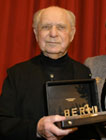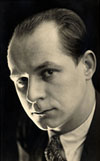








|
|
The Sounds of Silents
 Willy
Sommerfeld looks back on a musical career lasting over 80 years. Born in
Danzig on May 11th, 1904, today he is the last surviving silent film
pianist. Willy
Sommerfeld looks back on a musical career lasting over 80 years. Born in
Danzig on May 11th, 1904, today he is the last surviving silent film
pianist.
In 1920 he goes to Berlin, where he studies composing at the Sternsches
Konservatorium. As a side job, he earns a little money working at a
theater near Wittenbergplatz, where he plays violin accompaniment to a
professor on the piano. Later, Sommerfeld himself plays the piano. Then
and now, he accompanies films based on his intuition, never playing by
notes. As he himself once said, "The images I see on screen go to my
head, and from there straight to my hands. And since I'm so short, that
happens very fast." As a piano man, he went on to attain national
acclaim, receiving the Bundesfilmpreis (Federal Film Award ) in 1995.
In the late 1920s, he writes for a Braunschweig music publishing house.
Later, he becomes a bandmaster and conductor at a Braunschweig theater.
His failure to give the 'Hitler Salute' in 1933 spells the end of his
'piano career.' He finds a job in radio, where he writes music for radio
dramas. After the war, Sommerfeld works as a musical arranger and music
therapist. For years, he has humbly given publicists, journalists,
scholars and documentarians insight into his life and work. Willy
Sommerfeld is not a man of many words; he prefers to sit down at the
piano and play. He is truly a phenomenon, for he has the gift of
transforming any on-screen emotion, no matter how complex, into music.
Ilona Ziok's documentary film "Sound of Silents – Der Stummfilmpianist"
portrays the life and work of Willy Sommerfeld in vivid images and
interviews. It will be released in German theaters in May, coinciding
with Willy Sommerfeld's 102nd birthday.
Even today, Willy Sommerfeld is not even thinking about stopping.
Instead, he continues to play, and before every show, he merely asks the
same question: "Will it be a happy film or a sad one?"
Willy Sommerfeld - Vita
 May
11,1904 born in Danzig May
11,1904 born in Danzig
1920 State Exam as music teacher for violin
1921 Berlin: studies in bandleading and music composition at the
Sternsches Konservatorium (under Prof. Felietz)
1921-1926 silent film accompaniment on piano and violin
1926 Braunschweig: proofreader at Litolf music publishing house. Side
job as conductor of a 12-man cinema orchestra at the UFA cinema in
Braunschweig
1927-1934 bandleader at the Braunschweig Theater
1933 National Socialist seize power. Ban on performing following refusal
to show the Nazi director the 'Hitler salute'
1934 Leipzig: pianist with the group 'Four Newsmen' (with Helmut
Käutner)
1935 'Four Newsmen' are banned from performing
1935 return to Berlin
1935-1945 radio drama recordings for German shortwave radio station;
house composer at the Theater am Schiffbauerdamm, Freie Volksbühne
Berlin and Schauspielhaus Leipzig
until 1945 music for theater tours and troop entertainment at the front
1945 conductor of the show orchestra Neue Scala (now Metropol) in Berlin
1948 stage music for director Rochus Gliese at the Landestheater
Potsdam. Head of March Brandenburg symphonic orchestra
until 1950 performances throughout Germany
1950 onward studio music for records, including light entertainment
music and fairy-tales for musical slide shows
1952-1954 conductor of Baclay circus orchestra on Friedrichstraße
1954-1958 musical director and conductor of Hans Otto Theater in Potsdam
1958 marriage to Doris
1958 onward music for records
1961 Berlin Wall is built: record companies leave Berlin.
Economic hard times. Musical direction of Theater des Westens; musical
entertainment evenings for seniors
1966 birth of son Sebastian
1968 onward retirement
1972 'Friends of the German Cinema' (Freunde der deutschen Kinemathek)
discover Sommerfeld as one of the last silent film pianists and hire him
as their house pianist in the Arsenal Cinema, where he had played over
70 years ago (originally named Bayreuther Lichtspiele).
1972 onward performances as silent film pianist throughout Germany.
Accompaniment of cinema into the new era, i.e. at the opening of the
Hamburg Cinemaxx
November 29, 1988 receives National Medal of Merit of the Federal
Republic of Germany
April 30, 1994 receives honorary professorship from the Berlin Senate
for his outstanding activities
1995 receives Bundesfilmpreis (Federal Film Award) for exceptional
service to German cinema, Golden Cinema Ribbon
2004 receives Berlinale Camera Award
|
|
|